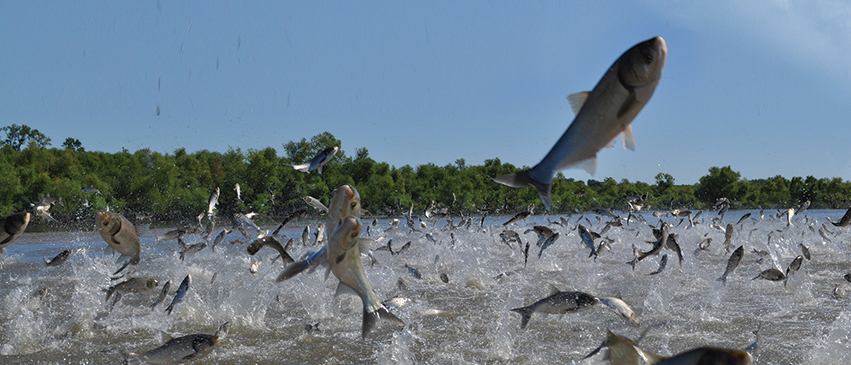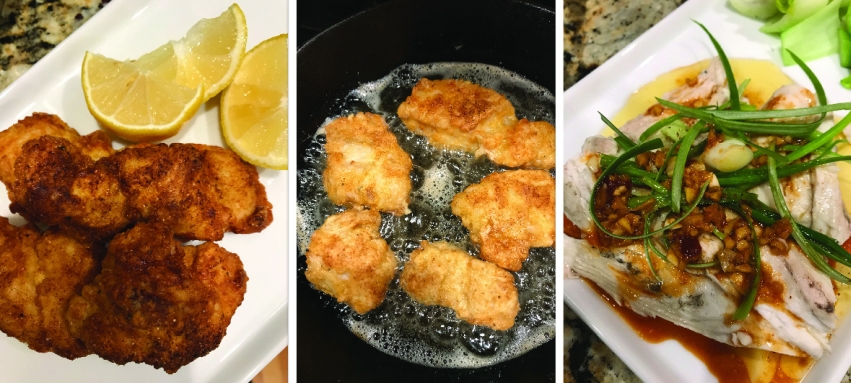
Invasive Asian carp have been problematic residents of the Illinois River for decades, undermining river ecology and recreation. There has not been a way to consistently manage them—until now. Roy Sorce, owner of Sorce Freshwater and Sorce Enterprises in East Peoria, is at the epicenter of a wide net of stakeholders tactfully undertaking the Asian carp issue. By creating a business model and preparing fish to eat, he and his team are creating what may be an entirely new industry to bolster the region.
Making Carp Connections
In some places on the Illinois River, Asian carp comprise up to 70 percent of the total biomass. “What if it’s only 10 or 20 percent?” suggests Kevin Irons, assistant chief of fisheries at the Illinois Department of Natural Resources (IDNR). “We think that’s where we want to be. If we can’t eradicate—and we think that’s going to be very difficult—these lower numbers become more of a functioning ecosystem.”
In late 2018, two crucial events occurred that ultimately brought Asian carp to the region’s forefront: Tri-County Regional Planning Commission (TCRPC) produced the Peoria Lakes Comprehensive Conservation Plan, which underscored the threat posed by Asian carp; and Irons hosted introductory meetings at Tri-County’s office about an incentivized harvesting program.
Irons is the linchpin of IDNR’s Enhanced Contract Fishing Program, which offers fishermen 10 additional cents for every pound of Asian carp harvested from the Peoria Pool. “We want to encourage [fishermen] to come to Peoria first, remove these fish, and that 10 cents a pound gives them some incentive,” Irons adds.
To ensure fishermen can keep their fish fresh, IDNR began searching for accessible riverside locations to house an ice machine. Irons’ connection with Ray Lees, TCRPC planning program manager, spurred community outreach that proved to be fundamental to the initiative’s progress. Lees then contacted Sorce, whose operation is fittingly located along the Illinois River. As luck would have it, Sorce was transitioning his food enterprise and seeking new opportunities to utilize his significant refrigerated space.

An Appetizing Business Model
“I talked to Ray, and we discussed putting an ice machine in for the commercial fishermen on my property,” Sorce says. But they knew they could do more than just provide ice. “We thought we could also provide a location to store product for them as it was processed. And then as that evolved, we decided to start receiving the fish for the fishermen… Now we’re looking at processing the fish.”
This initiative helped to streamline existing regional efforts. Fishermen who previously drove hours to sell their fish—with no guarantee it would be purchased—now had a hub at Sorce Enterprises to bring their fish and get paid promptly.
Sorce accepts two levels of Asian carp quality: one for human consumption, and one for bait or fertilizer. He hopes to create 75 to 80 jobs and harvest 15 million pounds of Asian carp from the Peoria Lakes over the next few years. “Hopefully, people would be able to enjoy the waterways out there… without having to deal with the Asian carp jumping in their boats or hitting them in the head when they’re water skiing,” he adds.
Clint Carter, an avid fisherman and president of the Midwest Fish Co-Op, developed connections in Illinois and even Louisiana as he helped create the co-op. “Back in the ‘50s, ‘60s and ‘70s, there were a lot of fishermen on the Illinois and Mississippi rivers or inland waters, but over the years, it’s really died out,” he explains. “So economically helping the guys who are out there harvesting it, that’ll probably trickle down to the younger generation… hopefully it spreads throughout the country.” He also owns Carter’s Fish Market in Springfield, where he has been serving Asian carp on and off for about 10 years.
From Peoria Lakes to a Restaurant Near You
Asian carp is extremely high in protein, contains all nine essential amino acids, and is overall a healthy, flavorful food—“a chameleon,” Irons suggests. “If you want them to taste like tacos, we can flavor them up like tacos. If you want to have a fish fry, Carter’s Fish Market down in Springfield, they do them up like a Friday evening fish fry.” A variety of Asian carp educational and tasting events have sprung up throughout the region, sponsored by IDNR and supported and initiated by Sorce.
The fish has now been served in restaurants, including Peoria’s own Kelleher’s, with the help of owner Pat Sullivan; the Rotary Club of Peoria; and dining halls at the University of Illinois and Southern Illinois University. “Now, [the market] is more geared towards the younger generation—people who want to have sustainable food choices, food with a story,” Carter adds.
“We couldn’t be more proud to be a part of this initiative,” says Colleen Callahan, IDNR director and a strong supporter of this collaborative. “We have food deserts right in our own backyard. So if we can make those connections, start there and see how this protein source has been so helpful and beneficial, that will make it easier for us, then, to expand that into other states, into other regions, and throughout the world.” PM
Reema Abi-Akar and fellow Tri-County Regional Commission planner, Michael Bruner, collaborated with Chuck Theiling, U.S. Army Corps of Engineers research ecologist, to develop the Peoria Lakes Comprehensive Conservation Plan referenced in this article.
- Log in to post comments

